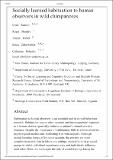Files in this item
Socially learned habituation to human observers in wild chimpanzees
Item metadata
| dc.contributor.author | Samuni, Liran | |
| dc.contributor.author | Mundry, Roger | |
| dc.contributor.author | Terkel, Joseph | |
| dc.contributor.author | Zuberbuehler, Klaus | |
| dc.contributor.author | Hobaiter, Cat | |
| dc.date.accessioned | 2015-02-07T00:01:44Z | |
| dc.date.available | 2015-02-07T00:01:44Z | |
| dc.date.issued | 2014-02 | |
| dc.identifier | 97078064 | |
| dc.identifier | 2184f4e8-2de3-4778-ab9f-cb3f959960a0 | |
| dc.identifier | 84903121131 | |
| dc.identifier | 000338235200015 | |
| dc.identifier.citation | Samuni , L , Mundry , R , Terkel , J , Zuberbuehler , K & Hobaiter , C 2014 , ' Socially learned habituation to human observers in wild chimpanzees ' , Animal Cognition , vol. Early online . https://doi.org/10.1007/s10071-014-0731-6 | en |
| dc.identifier.issn | 1435-9448 | |
| dc.identifier.other | ORCID: /0000-0002-3893-0524/work/46125064 | |
| dc.identifier.other | ORCID: /0000-0001-8378-088X/work/64360775 | |
| dc.identifier.uri | https://hdl.handle.net/10023/6076 | |
| dc.description | Fieldwork of CH and LS was funded by grants from the British Academy and a Leverhulme Trust’s Research Leadership Award. | en |
| dc.description.abstract | Abstract Habituation to human observers is an essential tool in animal behaviour research. Habituation occurs when repeated and inconsequential exposure to a human observer gradually reduces an animal’s natural aversive response. Despite the importance of habituation, little is known about the psychological mechanisms facilitating it in wild ani- mals. Although animal learning theory offers some account, the patterns are more complex in natural than in laboratory settings, especially in large social groups in which individual experiences vary and individuals influ- ence each other. Here, we investigate the role of social learning during the habituation process of a wild chim- panzee group, the Waibira community of Budongo Forest, Uganda. Through post hoc hypothesis testing, we found that the immigration of two well-habituated, young females from the neighbouring Sonso community had a significant effect on the behaviour of non-habituated Waibira indi- viduals towards human observers, suggesting that habitu- ation is partially acquired via social learning. | |
| dc.format.extent | 9 | |
| dc.format.extent | 2759119 | |
| dc.language.iso | eng | |
| dc.relation.ispartof | Animal Cognition | en |
| dc.subject | Female transfer | en |
| dc.subject | Observational conditioning | en |
| dc.subject | Dispersal | en |
| dc.subject | Culture | en |
| dc.subject | Social referencing | en |
| dc.subject | Social learning | en |
| dc.subject | QL Zoology | en |
| dc.subject | SDG 10 - Reduced Inequalities | en |
| dc.subject.lcc | QL | en |
| dc.title | Socially learned habituation to human observers in wild chimpanzees | en |
| dc.type | Journal article | en |
| dc.contributor.institution | University of St Andrews. School of Psychology and Neuroscience | en |
| dc.contributor.institution | University of St Andrews. Institute of Behavioural and Neural Sciences | en |
| dc.contributor.institution | University of St Andrews. Centre for Social Learning & Cognitive Evolution | en |
| dc.identifier.doi | 10.1007/s10071-014-0731-6 | |
| dc.description.status | Peer reviewed | en |
| dc.date.embargoedUntil | 2015-02-07 |
This item appears in the following Collection(s)
Items in the St Andrews Research Repository are protected by copyright, with all rights reserved, unless otherwise indicated.

